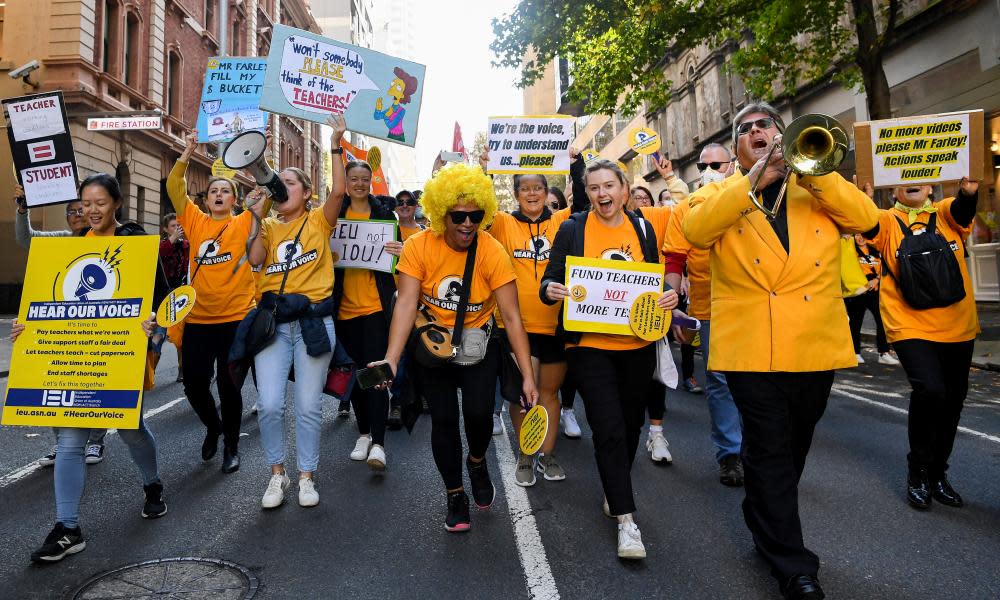NSW teachers will strike next week over the government’s 3% pay rise offer

Public and Catholic school teachers in New South Wales will strike next week after the state government handed down its budget on Tuesday including the already announced 3% lift to the public wage cap, which the NSW Teachers Federation and the Independent Education Union say will act as a cut to real wages.
Unions representing other public sectors will meet over the coming week to decide on next steps once they have had a chance to examine the budget papers, which union bosses claimed lack detail.
The state opposition leader, Chris Minns, supported the teachers in their decision to walk off the job, but would not put a figure on what he would raise public sector wages to if he was elected into office in March next year.
“If you’re a teacher on the frontline … dedicating your life to the vocation of education, you’d be furious that the NSW government isn’t sitting down and negotiating in good faith,” Minns said, despite claims from the education minister, Sarah Mitchell, that she met with the union last week.
The NSW Teachers Federation president, Angelo Gavrielatos, said the government needed to act on “uncompetitive salaries and unsustainable workloads”.
“We asked the premier to reconsider his decision to cap the pay of teachers at 3% when inflation is more than 5% and rising,” he said. “Yet, he did nothing.”
The sentiment was echoed by the general secretary of the Public Service Association of NSW, Stewart Little, who said prison officers would “now have less to spend on groceries than they did last year”.
The treasurer, Matt Kean, rebuked the unions, saying their actions had “nothing to do with pay and has everything to do with politics”.
Minns has questioned some “heroic assumptions” included in Kean’s first budget, saying it was unclear how the state’s economy would grow at an unprecedented rate over the next year.
“This is a budget that’s been handed down when you don’t have a long-term plan for investment in Australia’s largest state – you end up spraying money in every direction,” he said.
“While the rest of the world, America and Europe, are bracing for a recession, the NSW government believes that we will have huge growth in Australia’s largest state over the next 12 months.”
Despite NSW currently holding a triple-A credit rating from Moody’s, the global firm said in a statement after the budget papers were released that spending programs would “widen the state’s operating deficits beyond our initial expectations”.
“The introduction of recurrent expenditure heightens the state’s vulnerability to an unprecedented revenue decline … and will ultimately determine the ability of the state to achieve operating balance in fiscal 2025,” the statement said.
Related: Matt Kean’s budget is all about women – but is it also about the future of the Liberals?
Minns also accused the state government of introducing the start of a “never-ending” land tax that the premier, Dominic Perrottet, introduced as an alternative to stamp duty for first homebuyers buying properties under $1.5m.
Minns will deliver his formal budget reply on Thursday, flagging alternative ideas to make it easier for first homebuyers to enter the market, which could include increasing the tax exemption threshold.
Parts of the budget, including a plan to bolster the healthcare workforce, were welcomed by the NSW Nurses and Midwives’ Association, but the acting assistant general secretary, Michael Whaites, said they needed more information before a planned meeting with members next week.
“There is a lack of detail in exactly how many additional nurses and midwives will be added to the system above and beyond normal growth,” he said of the promised additional 10,000 healthcare staff over four years.
“Because of that lack of detail, there is no security that this budget will provide workload relief for our members.”
He said there needed to be a systemwide reform of the way nursing levels were calculated for different settings and called on the government to frontload its onboarding of additional staff to ease the pressure of fatigued nurses.
The NSW Health Services Union secretary, Gerard Hayes, said the 3% increase for this year was “OK” and the $3,000 in cash for healthcare workers was welcomed.
Related: NSW state budget 2022: lessons learned from Coalition election losses
“But we are not signing on for two years of that,” he said.
“We believe in award modernisation. We want to take some time now to see how the headline works through in the miniature. We need people and resources sooner rather than later.”
Among the biggest winners in the budget were women, with a host of major investments in early childhood education and care totalling $16.5bn over the decade.
The Business Council chief executive, Jennifer Westacott, said the measures would boost female participation in the workforce “which is good for families, good for businesses and will help manage chronic labour shortages across the economy”.

 Yahoo News
Yahoo News 
